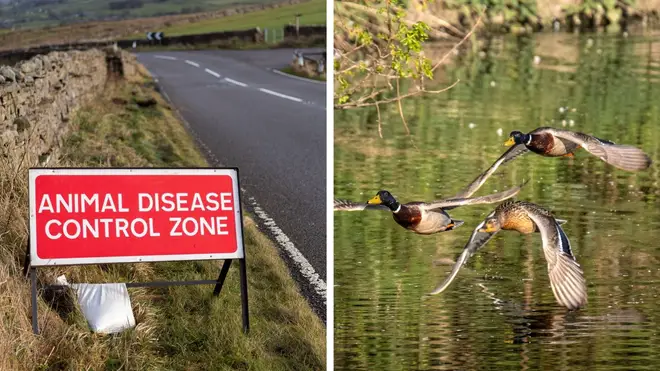
Paul Brand 10am - 12pm
3 November 2021, 17:56 | Updated: 3 November 2021, 19:09

A bird flu protection zone has been declared across England, Scotland and Wales.
It has been set up after a number of cases were detected in animals across Great Britain.
The introduction of the zone will mean tougher rules for those keeping more than 500 birds.
Measures include keepers needing to restrict access to enclosures for non-essential people, changing clothing before entering and cleaning areas regularly.
However, the Government has said the risk to public health from the virus is very low.
It comes after bird flu was identified in poultry and wild birds at a premise in Wrexham.
In a joint statement the Chief Veterinary Officers for England, Scotland and Wales said: "Following a number of detections of avian influenza in wild birds across Great Britain we have declared an Avian Influenza Prevention Zone across the whole of Great Britain.
Read more: Bird flu discovered in poultry as authorities impose 'control zone'
"This means that all bird keepers must take action now to prevent the disease spreading to poultry and other domestic birds.
"Whether you keep just a few birds or thousands, you are now legally required to introduce higher biosecurity standards on your farm or small holding. It is in your interests to do so in order to protect your birds from this highly infectious disease.
"The UK health agencies have confirmed that the risk to public health is very low and UK food standards agencies advise that bird flu poses a very low food safety risk for UK consumers."
The zone follows the decision to raise the risk level for bird flu "incursion" in wild birds across Great Britain from medium to high.
Read more: China reports world's first human case of H10N3 bird flu
A "temporary disease control" ranging between three and 10 kilometres was initially imposed around a small premises in Wrexham County Borough, Welsh authorities said.
The risk to public health was said to be "very low" in that case and not a threat to food safety.
However, people there were asked not to pick up or touch any sick or dead birds, and instead call Defra's helpline on 03459 33 55 77.